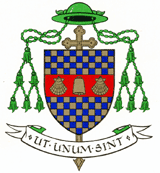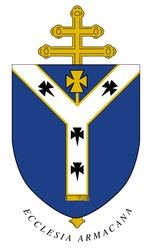FRIDAY 30 APRIL 2010
HOMILY BY
CARDINAL SEÁN BRADY
Every time I hear that Gospel, I am reminded of a visit which I made to the Holy Land a couple of years ago. We were staying in Jerusalem, but on the Sunday morning, we travelled north to that country between Samaria and Galilee, which was mentioned in the Gospel we have just heard. It was exactly in the land which Jesus met the ten lepers. We came to this little Christian village, which is a tiny pocket of Christians in the midst of their neighbours who are all Arabs and Muslims.
We celebrated Mass with them. I have never forgotten the enthusiasm and the faith of that parish community. The men sat on one side of the church and the women on the other and the children in the middle as we used to do here fifty years ago. But they sang with great gusto and I imagined that perhaps they were descended from those ten lucky men on whom the Lord took pity on all those centuries ago.
After Mass we were brought to the Parish Hall, as we will do here this evening, and I was introduced to the Parish Elders and treated to a tiny cup of black coffee, laced perhaps with a hint of brandy. I was reminded of the wonderful occasion here this evening, not alone by the account of the miracle which took place there 2000 years ago, but also by the joy and enthusiasm which gathers us here to give thanks to God this evening.
I have read the lovely Commemorative Record specially prepared for this celebration. It reminds me of how much we have for which to thank God. First and foremost, the people and their faith, a faith which is nourished and strengthened and has been nourished here over the last 175 years. It is nourished by the Word of God. I am glad to see the Ministers of the Word mentioned first. It is indeed a key role. What a treasure to have so many willing volunteers to prepare for and to proclaim the Word. Of course it is always an immense privilege to announce God’s Word to God’s people. As you do so, my dear Readers, I hope that your own spiritual life is the first to be nourished by it.
I was thrilled to hear that there are over 100 parishioners who have Holy Communion brought to their homes each weekend. This immense generosity of the extraordinary Ministers ensures that these parishioners do not feel isolated or cut off from the life of the parish but instead are able to receive the Body of Christ in the Blessed Sacrament. That generosity of course springs from the generosity of Christ who gives us his body and blood to be our food.
What a delight to know that since 2003, thanks to the initiative of Fr Tommy McGeough and Fr McKeever, there has been Adoration of the Blessed Sacrament for up to twelve hours every Tuesday and Wednesday. It is an excellent devotion and especially welcome as w prepare for the Eucharistic Congress in 2012.
I read, with interest, the historical notes on St Patrick’s, Clonalig and Anamar Primary Schools and St Joseph’s High School. Here this evening we gladly thank God for the work of teaching and education which goes on here. We ask God to bless the teachers of the parish and reward them for this.
The Booklet condenses the history of this Church into five pages, which I will not attempt to summarise here. You will have to read them for yourselves. I recommend that you do so and that you do so carefully for those pages contain your history and the history of your parents and grandparents and great grandparents. There are references to the 14 Parish Priests who have been here over the last 200 years and a list of the 56 churches.
It is good that the Lourdes Jubilee statue gets mentioned. I always associated people from Crossmaglen with pilgrimages to the Shrine of Our Lady at Lourdes. But, of course, it is not easy to summarise in a few words what that means. It means a deep love of Our Lady, a tender devotion to St Bernadette, a wonderful care and compassion for the sick. All that is best about any parish, and certainly all that represents the very best of life in this parish of Upper Creggan. I am really grateful for the immense support given by this parish to the Diocesan Pilgrimage to Lourdes.
There is a lot more in the Booklet which describes the life, culture and tradition of you, the people of Upper Creggan. That is only right because the joys and the sorrows, the hopes and the dreams, the achievements and the failures of its people are also those of the Church. Over the past 175 years this Church of
St Patrick has been central to all of that.
Naturally there is a lot about Gaelic Football and the exploits of the former Gaelic Clubs in this parish, Silverbridge, Shelagh, Cullaville and Crossmaglen Rangers. For obvious reasons the Rangers get the ‘lion’s share’ of the coverage.
Long before I became Archbishop of Armagh I had heard lots about Crossmaglen. I used to attend the Annual Congress of the GAA – where the Blessed Oliver Plunkett Park – later to become, of course, The St Oliver Plunkett Park used to feature prominently on the agenda. So, in 1996, when I came here to bless the new Ceannarus I felt I was, in a way, coming to a place which I already knew very well. I am also glad to recall that in that year the glorious run, which landed 13 County, 7 Ulster and 4 All-Ireland titles, began.
I use the word ‘glorious’ deliberately because the fact is that we all like glory. We are all made for glory. We are all made for glory that lasts, not just for thirteen, or for thirty years, but forever. That is why this evening’s First Reading from the prophet Ezekiel is so relevant.
There the Prophet describes the vision he had of the glory of the Lord God which fills the temple. The voice of the Lord which said: “I shall live here among the sons of Israel forever”. That everlasting glory of the Lord God is the only kind of glory that will ever satisfy the hungers of our hearts.
And that takes us to the heart of this evening’s ceremony when we come to try and replay the Lord for his goodness to each one of us. It would be good for each one of us to list ten things for which to give thanks. ‘The thankful person is a happy person’ the scientists tell us.
St Paul tells us he never stops thanking God for al the graces which his readers – the people of Cormil had received through Jesus Christ.
Basically that is essentially what we are doing here this evening also – thanking God that you have ben enriched in so many ways – especially in teachers and preachers. They have enriched you with their wisdom and their help in this Church down through the years.
We give thanks that this witness to Christ that has been so strong among you. That witness is to be seen in the response you give to all you have heard within these four walls
• In your response to the call to repentance during Parish missions.
• In your response to the invitation to give praise and glory to God.
• In your response to go out and bring God’s healing help and love to so many.
This evening we give thanks that so many of us are willing to put the gifts you received from the Holy Spirit at the service of the work of building up God’s kingdom. You do this in various ways. For example through your work on various committees and societies. We look to the future with great confidence and great joy – our Risen Lord Jesus Christ will keep you standing until the last day. The reason is simple – by calling you, God has joined you to his son, Jesus Christ and God.
GOD IS FAITHFUL
Those who built this Church knew from their experience that God is faithful. Within 10 or 12 years they would learn that the hard way as they gathered here to bury the victims of the Great Famine. Yes – God is faithful.
This is the Year of the Priest. We thank God for all the sons of this parish who have chosen the path of the priesthood life. We are especially grateful for their parents and families to whom, under God, we priests in a sense, owe our vocations.
All of us feel that the late Cardinal Ó Fiaich belongs to us and, of course, he does. I have many fond memories of his many visits to Rome between 1980 and 1990. The delightful reminiscences by Deirdre Ó Fiaich will revive many precious memories for a lot of people. The greatest monument which we all could build to his memory would be a firm resolution to pass on our faith to those who come after us and to pray that many others, from this parish, will follow in his footsteps and so find fulfilment in this life and in the next.
INTRODUCTION
We gather to give thanks to God for 175 years of the life of the Church of St. Patrick, Crossmaglen. As we do so I am very conscious of the plight of Natasha McShane – a native of this parish – who is critically ill in Chicago – as a result of the injuries received in a physical attack. We bring Natasha and her family before the Lord this evening.
I welcome you all here this evening and if I may presume to do – I welcome especially the priests – either native sons or who have worked here in the past.
We are all here to recall the goodness of a generous and gracious God. We are here to recognise the loving presence of that God in our midst and to respond to that presence with honour, praise and glory. As we do so, we hope that one day, in the future, in union with all who ever worshipped in this Church, we will ourselves share in that supreme glory.






You must be logged in to post a comment.